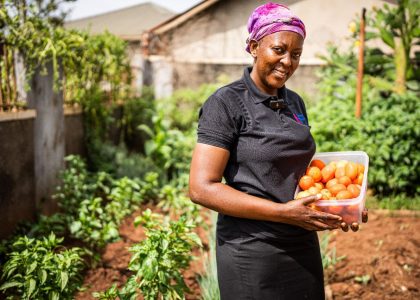Life in Active Gardening for Income and Nutrition (Life AGAIN)
The Situation: In Uganda, as in many countries across the world, COVID-19 has challenged communities and the government in unprecedented ways. As health officials try to control the virus and protect people’s health, the lockdowns imposed to contain transmission put livelihoods under immense strain, leaving many people without enough food to eat. COVID-19 has forced and is forcing families to either reduce the number of meals, amount or quality of food they eat a day. Those unable to meet their family food needs are turning to others for help – first to friends or family, then to the government’s emergency food packages[1]. Domestic violence and resorting to Food based coping strategies such as reducing the number of meals per day and begging for food became the norm.
James Bisheko, the founder of Help Her International and his wife Grace have since the 1st Uganda’s 9-months nationwide total lockdown (March – November 2020) been involved in backyard garden establishment initiatives in their surrounding communities in Kireka (Wakiso district) near Kampala city. Using their home as an example and sharing photos as inspiration, 10 gardens were established through volunteer efforts, which not only addressed the nutrition gap in homes that so badly needed immunity boosting foods but also worked as a source of income for some. The gardening method does not require access to large chunks of land. Households use verandas and compounds to plant mainly quick-maturing vegetables. Putting food on the table is a major responsibility of a woman in Uganda. Any help to improve household access to food is relief to the woman in that home.

Impact of lockdowns on households’ capacity to survive: The second wave of COVID-19 in Uganda (May-September 2021) and its associated 42 days lockdown was a big setback to the gradual pace of economic recovery observed late 2020. Movement restrictions coupled with closure of businesses and low purchasing capacity by the poor and unemployed resulted in low food demand in urban areas. Farmers are getting lower farm-gate prices especially for perishables like cooking bananas, horticultural commodities, and poultry products. Many urban poor households which rely on daily wages to purchase food experienced diminished income and purchasing capacity given that they have limited alternative livelihood options[2]. Despite the lockdown, rural households that depend more on own food production are not expected to experience consumption deficits. Farmers are however earning less income than usual from crop sales due to low prices, limiting their ability to access other nonfood needs.
Women’s experiences during lockdown: Most Ugandan women are in informal work and have suffered disproportionately from the closure of markets and the ban on public and private transport. As a result, the survey reports that women’s dependence on others has increased, and household food security has decreased. Consequently, COVID-19 has reduced the capacity of women to generate income and feed their families. Coupled with the increased time spent together in lockdown the pandemic has led to women and children experiencing more gender-based violence.

Building on the initiative of the Bishekos, who have been working with Help Her International in promoting household backyard garden initiatives among the urban poor women in Wakiso district; a skill they learned from Kampala City Authority horticultural farming demonstration farm back in 2016, Help Her International plans to Life in Active Gardeningfor Incomeand Nutrition (Life AGAIN) project targeting 100 households as a pilot with the goal of improving food security and income for vulnerable women especially widows and single mothers in Kira and Nansana Municipalities of Wakiso District. Life AGAIN is a household-focused intervention that promotes gardening for nutrition and boosting people’s immunity before, during and post COVID-19 infection as well as improving household income. Establishing such a garden requires inputs from both an agronomist and a nutritionist for farm management and food utilization classes, respectively. On average, each household garden establishment costs $70 including trainings and garden inputs. The gardens are mainly comprised of high nutrition-value and quick maturing vegetable varieties, especially for children and expecting mothers’ nourishment. Surplus vegetables are sold or subjected to value addition practices to increase the value obtained from the women’s efforts.
[1] https://www.iied.org/address-food-insecurity-uganda-post-covid-19-government-must-act-now
[2] https://fews.net/east-africa/uganda/food-security-outlook/june-2021











